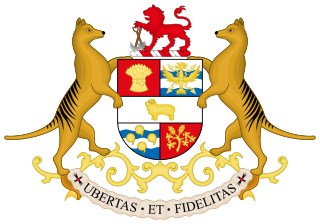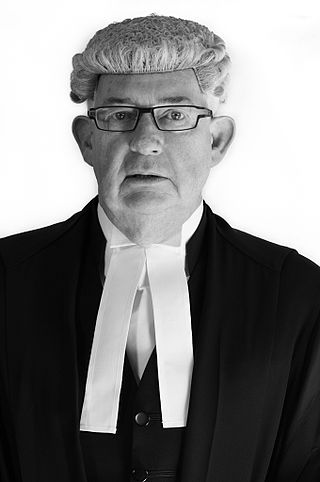
The Judicial Committee of the Privy Council (JCPC) is the highest court of appeal for the Crown Dependencies, the British Overseas Territories, some Commonwealth countries and a few institutions in the United Kingdom. Established on 14 August 1833 to hear appeals formerly heard by the King-in-Council, the Privy Council formerly acted as the court of last resort for the entire British Empire, other than for the United Kingdom itself.

The Supreme Court of New Zealand is the highest court and the court of last resort of New Zealand. It formally came into being on 1 January 2004 and sat for the first time on 1 July 2004. It replaced the right of appeal to the Judicial Committee of the Privy Council, based in London. It was created with the passing of the Supreme Court Act 2003, on 15 October 2003. At the time, the creation of the Supreme Court and the abolition of appeals to the Privy Council were controversial constitutional changes in New Zealand. The Supreme Court Act 2003 was repealed on 1 March 2017 and superseded by the Senior Courts Act 2016.

The Oregon Supreme Court (OSC) is the highest state court in the U.S. state of Oregon. The only court that may reverse or modify a decision of the Oregon Supreme Court is the Supreme Court of the United States. The OSC holds court at the Oregon Supreme Court Building in Salem, Oregon, near the capitol building on State Street. The building was finished in 1914 and also houses the state's law library, while the courtroom is also used by the Oregon Court of Appeals.

The Supreme Court of Tasmania is the highest State court in the Australian State of Tasmania. In the Australian court hierarchy, the Supreme Court of Tasmania is in the middle level, with both an appellate jurisdiction over lower courts, and decisions made by Court to be heard on appeal by the High Court of Australia.

Patrick Errol Higginbotham is an American judge and lawyer who serves as a Senior United States circuit judge of the United States Court of Appeals for the Fifth Circuit.

Martha Elizabeth Moxley was a 15-year-old American high school student from Greenwich, Connecticut, who was murdered in 1975. Moxley was last seen alive spending time at the home of the Skakel family, across the street from her home in Belle Haven. Michael Skakel, also aged 15 at the time, was convicted in 2002 of murdering Moxley and was sentenced to 20 years to life in prison. In 2013, Skakel was granted a new trial by a Connecticut judge who ruled that his counsel had been inadequate, and he was released on $1.2 million bail. On December 30, 2016, the Connecticut Supreme Court ruled 4–3 to reinstate Skakel's conviction. The Connecticut Supreme Court reversed itself on May 4, 2018, and ordered a new trial. On October 30, 2020, the 45th anniversary of Moxley's murder, the state of Connecticut announced it would not retry Skakel for Moxley's murder. The case attracted worldwide publicity, as Skakel is a nephew of Ethel Skakel Kennedy, the widow of U.S. Senator Robert F. Kennedy.

Jon Ormond Newman is a senior United States circuit judge of the United States Court of Appeals for the Second Circuit.

Cole v Whitfield, is a decision of the High Court of Australia. At issue was the interpretation of section 92 of the Australian Constitution, a provision which relevantly states:
... trade, commerce, and intercourse among the States, whether by means of internal carriage or ocean navigation, shall be absolutely free.
Curtis Publishing Co. v. Butts, 388 U.S. 130 (1967), was a landmark decision of the US Supreme Court establishing the standard of First Amendment protection against defamation claims brought by private individuals.

The Magistrates Court of Tasmania is the main day-to-day court in the Australian state of Tasmania and exists in accordance with the laws handed down by the Tasmanian Parliament. The Court is an inferior court to the Supreme Court of Tasmania and, in terms of the Australian court hierarchy, is at the bottom level.
William John Ellis Cox, was Governor of Tasmania from 15 December 2004 to 2 April 2008, prior to which he was the state's Chief Justice and Lieutenant Governor.
The Coroners Court of Tasmania is the generic name given to the Coronial Division of the Magistrates Court of Tasmania. It is a court which has exclusive jurisdiction over the remains of a person and the power to make findings in respect of the cause of death of a person, a fire or an explosion in Tasmania.

Ilana Kara Diamond Rovner is a United States circuit judge of the United States Court of Appeals for the Seventh Circuit. Rovner was the first woman appointed to the Seventh Circuit. She was previously a United States district judge of the United States District Court for the Northern District of Illinois.
Shan Eve Tennent is a former Australian judge. She was a Judge of the Supreme Court of Tasmania between March 2005 and October 2017, and was the first woman to be appointed to the Court.

Burnie Port Authority v General Jones Pty Ltd is a tort law case from the High Court of Australia, which decided it would abolish the rule in Rylands v Fletcher, and the ignis suus principle, incorporating them generally into the tort of negligence.
The Judicial Conference of the United States, formerly known as the Conference of Senior Circuit Judges, was created by the United States Congress in 1922 with the principal objective of framing policy guidelines for administration of judicial courts in the United States. The Conference derives its authority from 28 U.S.C. § 331, which states that it is headed by the chief justice of the United States and consists of the chief justice, the chief judge of each court of appeals federal regional circuit, a district court judge from various federal judicial districts, and the chief judge of the United States Court of International Trade.
In Australia, murder is a criminal offence where a person, by a voluntary act or omission, causes the death of another person with either intent to kill, intent to inflict grievous bodily harm, or with reckless indifference to human life. It may also arise in circumstances where the accused was committing, or assisting in the commission, of a different serious crime that results in a person's death. It is usually punished by life imprisonment. Australia is a federal nation and the law of murder is mostly regulated under the law of its constituent states and territories. There is also federal murder offence available in limited circumstances.

Stephen Peter Estcourt is an Australian judge, who has been Puisne Judge of the Supreme Court of Tasmania since April 2013. From 2004 to 2013, he maintained barristers' chambers in Hobart and Melbourne, dividing his time between the two.
A private timber reserve is an area of privately owned land, used or intended to be used, for growing timber within the Australian state of Tasmania.
John William Avery is an Australian former barrister based in Hobart, Tasmania. Avery notably represented the perpetrator of the Port Arthur Massacre, Martin Bryant during pre-trial and sentencing proceedings before the Supreme Court of Tasmania in 1996, before himself being sentenced in the same court for misappropriation and stealing from clients of his firm in 2008.










